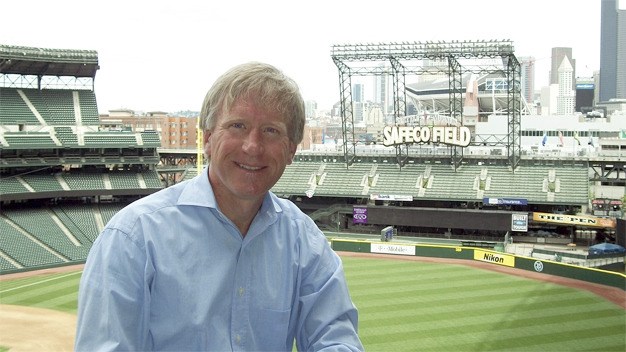The subject of sports usually does not come up during conversations about sustainability, but Scott Jenkins is working to change that.
As vice president of ballpark operations for the Seattle Mariners, the Mercer Island resident spends his days “greening” Safeco Field and working to turn it into an eco-friendly ballpark. On Wednesday, he shared some of their techniques and practices with Redmond businesses during this month’s Greater Redmond Chamber of Commerce member luncheon.
“We’ve had some unbelievable success,” he said about the programs they have initiated.
Jenkins joined the Mariners organization mid-season in 2006, and one of the first things he did was go over the organization’s utility bills and see where they could cut energy use. Since then, the stadium’s natural gas use has been reduced by 60 percent, the electricity use by 30 percent and water use by 15 percent.
In addition to being good for the planet, he told the lunch crowd that cutting down on utility usage has also been good for their bottom line as they have saved about $1.5 million at Safeco Field since he joined the team.
“It makes sense to conserve,” he said.
One of the biggest successes they have seen at the stadium has been with its recycling program.
Jenkins said Safeco Field’s recycling rate — the amount of overall waste that is recycled — in 2005 was 12 percent. That number has since increased to 81 percent, but he said he wants to see that figure bumped up to 90 percent.
To encourage stadium employees and baseball fans to dispose of their waste properly, Jenkins said they have designated specific containers for compost, plastic bottles and landfill waste. Corresponding signs and visuals make it easier for people to sort out what goes where.
“Signage is key,” he said, adding that they have saved $95,000 in landfill costs since setting up these “Zero Waste” stations.
Another way the Mariners have incorporated sustainability and environmental awareness into the culture at Safeco Field has been through trivia games and giveaways on game days. While T-shirts and bobble heads are commonplace, the Mariners have also been known to give fans kitchen compost containers and potting soil during the last couple of years.
Jenkins said the latter has been really popular among fans.
He added that using sports to engage people and encourage them to be more environmentally aware is a unique way to tell the sustainability story and inspire people to go green in their everyday lives.
“If we can do it, anyone can do it at home,” Jenkins said.
In addition to encouraging stadium workers and fans to do their part, Jenkins said the businesses, vendors, organizations and consultants they have worked and partnered with have been an important part of their success. He said buying the correct type of equipment, utensils and products has a significant effect on their programs.
“It’s really a collaborative effort,” he said, adding that he also meets with his counterparts at other stadiums and ballparks to see what they are doing and what has worked for them.
Jenkins is also a board member of the Green Sports Alliance (GSA), a nonprofit with the mission to “help sports teams, venues and leagues enhance their environmental performance,” according to its website.
The organization started in 2010 and has its roots in the Pacific Northwest: its six founding members are the Seattle Seahawks, Mariners, Sounders FC and Storm and the Vancouver Canucks and Portland Trail Blazers.
Now the GSA has more than 90 team and venue members representing 13 different sports leagues throughout North America.
“[Going green has] become one of the hottest topics among all ballparks in many of the leagues,” Jenkins said.
Samantha Pak is a reporter for the Redmond Reporter, a sister paper of the Mercer Island Reporter.


